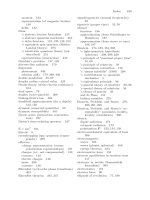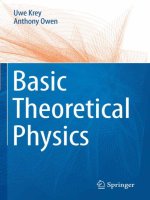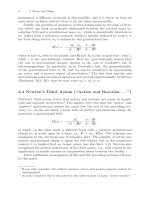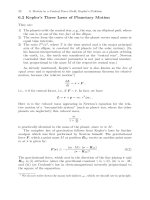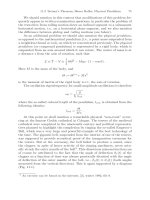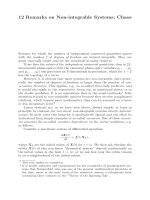- Trang chủ >>
- Khoa Học Tự Nhiên >>
- Vật lý
Basic Theoretical Physics: A Concise Overview P43 potx
Bạn đang xem bản rút gọn của tài liệu. Xem và tải ngay bản đầy đủ của tài liệu tại đây (114.6 KB, 10 trang )
Index 439
moment 133
representation (of magnetic bodies)
140
fields 132
Dirac
’s abstract bra-ket formalism 215
’s abstract quantum mechanics 210
’s delta function 112, 133, 138, 214
’s equivalent spin operator (Heitler-
London theory) 273
’s relativistic quantum theory (not
described) 251
representation (interaction) 245
Dirichlet’s problem 127, 128
discrete-line radiation 179
dispersion
phenomena 346
relation ω(k) 179, 399, 402
double pendulum 85, 87
droplet radius: critical value 425
Drude theory (of the electric resistance)
164
dual space 78
duality (wave-particle) 208
Dulong-Petit’s law 402
dumbbell approximation (for a dipole)
132, 140
dynamic conserved quantities 50
dynamic susceptibility 410
Dyson series (interaction representa-
tion) 247
Dyson’s time-ordering operator 247
E=mc
2
101
E¨otv¨os 8
eavesdropping (spy, quantum crypto-
graphy) 289
effective
-charge representation (versus
polarization representation) 137
charges (i.e., not compensated) 138
currents 149
electric charges 146
mass 286
currents 146
Ehrenfest (n-th order phase transitions)
403
Ehrenfest theorem 245, 247
eigenfrequencies (normal frequencies)
63
eigenzeit (proper time) 55, 59
eikonal
function 186
approximation (from Schr¨odinger to
Hamilton) 187
approximation (from waves to rays)
186, 187
Einstein 174, 183, 184, 203
’s light-quantum hypothesis
(photons) 208, 209, 220
’s principle of “maximal proper time”
55, 60
’s principle of relativity 58
’s summation convention 176
’s “annus mirabilis” (1905) 208
’s contributions to quantum
mechanics 4
’s equivalence principle 96
’s general theory of relativity 60, 96
’s special theory of relativity 58
’s theory of gravity 33
and de Haas 151
hidden variables 279
Einstein, Podolski, and Rosen 279,
290, 291, 295
Einstein, Podolski, and Rosen’s “ac-
ceptability” postulates (reality,
locality, retardation) 280
electric
dipole radiation 173
octupole radiation 173
polarization P 133, 134, 139
electro-mechanical equivalent of heat
306
electromagnetic
waves 163
waves (planar, spherical) 166
energy theorem 163
electromotive force 153
electron equilibrium in neutron stars
417
electrons in metals (Sommerfeld
formalism) 383
electrostatics 119
elevator force 96
ellipsoid of revolution 77, 190
440 Index
emission (induced versus spontaneous)
269
Emperor’s bell in Cologne 75
encoding (decoding) of a computer
message 284
energy
-momentum four-vector 103
dissipation 164
conservation 14
conservation for the electromagnetic
field 163
density of the electric field 142
density of the magnetic field 142
theorem (electromagnetic) 163
theorem (mechanics) 27, 28
conservation 50
entanglement 279, 291, 295
enthalpy I(T,p,N) 319, 320, 428
entropy
S(T,V,N) 301, 315, 350, 357, 427,
429
constant 415
from the microcanonical ensemble
363
of mixing 413, 414, 416, 421
equations of motion
Hamilton 53
Lagrange 53
Newton 5, 53
Lagrange 45
equipartition of energy 352
equivalence
of inertial frames 58
of mass and energy (Einstein) 104
principle (Einstein) 96
ergodic systems 367, 411, 412
Euler
’s relation (Moivre) 159
-Lagrange equations 48
angles ϕ, ϑ, ψ 81, 82, 91
equations of a rigid body 79
even normal modes 67
even parity 67
exchange integral 273
expansion theorem 215
expectation value in quantum
mechanics 218
extensive versus intensive variables
(thermodynamics) 314
extensive versus intensive work 320,
354
external force 23
external torque 24
extraordinary versus ordinary beam
(uniaxial birefringence) 191
extremal paths (Einstein) 96
Fahrenheit, R´eaumur (or Reamur)
303
far-field range 170, 173
Faraday’s induction law 124, 153, 155
Fermat’s variational principle of the
shortest optical path 55, 185,
187
Fermi
’s “golden rules” 179, 267, 269
and Bose gases 335, 337, 379
and Bose statistics 337
energy ε
F
383, 394
liquid 383
fermions 252
fermions and bosons 379, 383
ferroelectric systems 136
ferromagnetism
ˆ= interplay of Coulomb interaction
and Pauli’s principle 274
ideal 304
in solids 275
Feynman diagram for induced
absorption 269
Fick’s laws (heat diffusion) 306, 307
fictitious (=inertial) forces 95
field
-energy conservation 163
energy 141
tensor (skew-symmetric) in electro-
magnetism 176
figure axis 84
fine structure (of the spectra) 251,
256, 294
First and Second Laws of Thermody-
namics: Equivalent Formulations
315
First Law of Thermodynamics 313
first-order phase transitions 403
Index 441
fixed cartesian vectors for a rigid body
79
fluctuation-dissipation theorem 410
fluctuations 332, 333, 408, 428
fluid (liquid or gas) 305
flux tubes (vortex lattice) 398
Fock-Darwin theory 287
force
-power four-vector 102
and torque on electric and magnetic
dipoles 25, 139
of constraint 13, 90, 91
and torque on electric and magnetic
dipoles 140
Foucault pendulum 98
fountain effect (superfluidity) 394
four-vectors (Minkowski) 58
Fourier methods (heat conduction)
308
Fourier transformation (Fraunhofer
diffraction) 197
Fraunhofer diffraction at rectangular
and circular apertures 197
free
energy (Gibbs) F
g
(T,V,H,N) 366
energy (Helmholtz) F (T,V,N) 301,
353, 366, 396, 397, 427
energy (Helmholtz) of droplets 423
energy for Landau’s theory 404
enthalpy per particle (≡ μ in fluids)
365, 416, 418
frequency dispersion 179
Fresnel
’s integrals 195
ellipsoid (E-ellipsoid) 189
diffraction at an edge 193
diffraction versus Fraunhofer
diffraction 193
frictional force 17, 27, 45
frictional heat 305
fringes (in Fresnel’s diffraction from an
edge) 196
from reversibility (quantum mechanics)
to irreversibility: Fermi’s “golden
rules” 268
fundamental solutions (→ Green’s
functions) 168
g-factor 250, 294
Gabor 199
Galilean transformations 56, 90, 175
Galileo 5
gamma function 393
gas thermometer 303
gate voltage (of a quantum dot) 286
gauge
function 62, 165, 210
invariance of the Aharonov-Bohm
effect 282
transformations 61, 147, 148, 165
transformations in quantum
mechanics 217, 245
invariance 396
transformations in quantum
mechanics 216
Gauss
’s interface box 143
’s law 121, 153
’s geodesic triangulation in 1831 4
’s integral 115
’s integral theorem 130, 308
Gay-Lussac 335
Gay-Lussac’s experiment 317, 318,
324, 371, 430
general theory of relativity (Einstein)
4, 60, 97
generalized
coordinates 45, 47
forces of constraint 90
irrotational behavior 28
generator voltage (induction) 154
geoid model of the earth (oblate
spheroid) 99
geometrical optics (ray optics) 185
Gibbs
’ phase rule 419
’ grand canonical potential Φ(T,V,μ)
367, 428
’ phase rule 419
free energy F
g
(T,V,H,N) 354, 366
Ginzburg, Abrikosov, Legget 395
Ginzburg-Landau theory of supercon-
ductivity 395
glasses (C
V
∝ T ) 402
glassy behavior (non-ergodic) 412
global inertial frames (Mach) 96
Global Positioning System (GPS) 97
442 Index
Golden Rules (Fermi) 179, 267, 269
Goldstone modes 64
good quantum numbers
n, l, s, j, m
j
(for H) 250
general remarks (if at all) 255
N, L, S, J, M
J
(non-H atoms, shell
model) 255
n, l, s, m
l
,m
s
(for H, without
spin-orbit coupling) 250
N, L, S, M
L
,M
S
(for non-H atoms,
shell model, without spin-orbit
coupling) 255
parity 224
grand canonical
Boltzmann-Gibbs distribution 367
ensembles 366, 428
partition function Z(T,V,μ) 367,
428
potential Φ(T,V,μ) 428
gravitational forces 8, 39
gravitational mass 8, 119
Green
’s 2nd integral theorem 192
’s function 21
’s function methods (heat diffusion)
308, 310
’s integral theorem 308
group
velocity (≤ c) 183
velocity (meaning) 183
velocity versus phase velocity 179,
182
Grover’s algorithm (quantum comput-
ing) 285
gyromagnetic ratio 151
Hamilton
’s variational principle of “least
action” 48, 55
formalism 248
operator (quantum mechanics) ver-
sus Hamilton function (classical
mechanics) 294
operator for the Lorentz force 217
operator with spin 249
operator 216
Hamiltonian 45, 50
Hamiltonian for the Lorentz force 61
handedness 71
harmonic
functions 128
oscillator (algebraic treatment) 241
oscillator (Schr¨odinger’s wave
mechanics) 231
functions 127
Hartree-Fock approximation 254, 259,
408
He
3
(superfluidity) 278
He
4
(superfluidity) 278
He
4
versus He
3
(Bose versus Fermi)
338
heat
bath 366
capacity 305, 409
capacity of solids (Debye theory)
399
diffusion constant D
w
307
diffusion equation 307
general remarks (if at all) 305
of transition 403
production 164
electro-mechanical equivalent 306
Heaviside function 138
heavy fermions 386
heavy roller, i.e., a circular cylinder
rolling down an inclined plane
74, 91
heavy symmetric top 83
Heisenberg
’s “matrix mechanics”209
’s uncertainty principle 219
’s uncertainty relation (general form)
294
general remarks (if at all) 4, 169,
241
model (magnetism) 274, 405, 407
representation (aspect) 245
Heitler and London (diamagnetism of
H
2
) 271, 275
Heitler-London theory 287
Helmholtz free energy 366
Hermite polynomials 233
Hermitian operators 213
Hertz 173
Hertz’s oscillating electric dipole 170
Hertzsprung-Russel diagram (stars)
388
Index 443
hidden variables (Einstein) 279
Higgs boson (analogy with Cooper
pairs) 398
Higgs-Kibble mechanism (analogy with
Meissner-Ochsenfeld effect) 399
high-temperature superconductors
278
Hilbert space 211, 212, 293
history of quantum mechanics 207
holography 187, 199
holonomous constraints 45, 89, 93
holonomy 316
homogeneity 50
homogeneous differential equation 17
homogeneous fields 142
Hund’s rule (maximal multiplicity)
275
Hund’s-rule exchange 276
Huygens’s principle 169
Huyghens’s principle 184
hydrogen
atom (bound states) 237
atoms (product ansatz; radial
functions) 235
problem 31
atom (positive energies) 238
atoms (in Schr¨odinger’s wave
mechanics) 235
hyperbolas 37
hyperfine structure (of the spectra)
254, 256
ideal
ferromagnet 304
gas 303
heat machine (impossible, Thomson)
355
heat pump (impossible, Clausius)
355
paramagnets 304
identical particles 349, 379
impact parameter 41
incoherency (addition of intensities
instead of amplitudes) 344
incoherency of thermal averages 344
incoherent versus coherent radiation
268
independent partial systems 413
index ellipsoid (D-ellipsoid) 189
indistinguishability of identical particles
337, 350
induced dipole moment 136
induced emission and absorption 269
inductances (self-inductance and
mutual inductances) 158
induction
law (Faraday) 124, 153
voltage 154
charge 129
inertia ellipsoid 77
inertia tensor 73, 189
inertial
forces 95
frames 5, 56, 58, 96, 98
infinitesimal Carnot process (Clausius-
Clapeyron) 370
infrared (spectral range) 179
inhibited reaction equilibrium 416
inhomogeneous differential equation
17
integrable systems 85
integral theorem of Gauss 130, 441
intensive versus extensive variables
(thermodynamics) 314
intensive versus extensive work 320,
354
interaction representation (Dirac) 245
interaction-free quantum measurement
221, 287, 288
interface curl 143
interface divergence 143
interface-current density (for supercon-
ductors) 146
interference 283, 291, 295
internal energy U (T,V,N) 301, 315,
319, 353, 427, 428
internal force 23
inverse β-decay 418
inversion temperature 323
irreversibility 315
irrotational vector fields 125
Ising
model 332, 333, 354, 409, 425
model (lattice-gas interpretation)
333, 425
model (magnetic interpretation)
333
444 Index
isothermal changes of state 324
isotherms versus adiabatics 325
isotropy 50
Joule losses 164
Joule’s heat (Ohmic processes) 305
Joule-Thomson effect 321, 324, 372
Joule-Thomson process 319, 322
Kelvin temperature T 303, 427, 429
Kelvin thermometer (ideal gas, ideal
paramagnet) 304
Kepler
’s laws 32
’s problem (hyperbola orbits) 238
problems 50
kidney-shape (of dipole fields) 133
kilogram 7
kilopond 7
kinetic
energy 27
energy (relativistic) 103
energy: translational and rotational
parts 71
momentum 61
theory of Bose (Fermi) gases 335
theory of gases 311, 335
theory of relativistic gases 335
energy 46
Kirchhoff’s law 192
Kronecker symbol δ
i,j
214
Kuhn (philosophy of science) 3
ladder operators (ascending or
descending) 243
Lagrange formalism 89
Lagrange multiplier 90
Lagrangian
equations of the 1st kind 48, 91
equations of the 2nd kind 45, 48
equations of the 2nd kind with
constraints 91
for the Lorentz force 60
function 45
equations of the 2nd kind 47
Land´efactorg
J
(L, S) 265, 406
Landau’s theory (second-order phase
transitions) 403
Laplace identity 72
laser 199
laser cooling (ultralow temperatures)
371
latent heat (e.g., vaporization and
melting) 369
latitude ϑ 126
lattice-gas interpretation (Ising model)
332, 333, 425
law of mass action (chemical reactions)
417
least action (Hamilton’s principle) 55
left-handedness 71
Legendre polynomial 239
Legendre transform 428
Legget, Abrikosov, Ginzburg 395
Lenard (photoeffect) 208
length contraction 59
Lennard-Jones potential 323, 327
Lenz vector 39, 50, 236
light quanta (photons) 379
Linde process (liquefaction) 322
linear approximation (mean field) of
a Hamiltonian 334
linearity (e.g., of Maxwell’s equations)
120
linearity (of a theory) 21
liquefaction (Linde) 319, 322, 323
local inertial frames (Einstein) 5, 96
locality in quantum mechanics 279
locally orthogonal curvilinear coordi-
nates 126
longitude ϕ 126
Lorentz
force 27, 45, 153, 155, 217, 295
force (mksA versus cgs) 112
gauge 165, 176
transformations 56
transformations for the electromag-
netic fields 177
force 60
gauge 166
transformations 175
Loschmidt’s number L
0
(the number of
molecules in a mole) 303
losses of a response process 410
Mach 5, 96, 98
macroscopic versus microscopic
properties 301
Index 445
magnetic
dipole radiation 173
dipoles m 139, 140
dipoles (not always equivalent to
Amp`erian current loops) 149
field H 139, 313
fields of steady electric currents 145
induction B 139, 149, 314
moment m 313
monopoles (non-existence) 139, 140
polarization J 139, 314
susceptibility 319, 403, 409
work 313
magnetism 271
magnetization M = J/μ
0
314
magnetocaloric effect 372
magnetostatics 119, 139
magnons (spin-wave quanta) 185, 379,
399, 402
main-sequence stars 388
MAPLE, MATHEMATICA 161
Markoff chain 412
mass defect 104
mathematical (versus physical)
pendulum 75
Maxwell
’s displacement current 153, 156
’s equations in Gaussian units 111
’s equations in SI units 111
’s relations (thermodynamics) 317,
318, 322, 339, 369, 370, 429
’s theory: relativistic formulation
174
-Boltzmann ideal gases 335
-Boltzmann velocity distribution
337, 352
construction 329, 331
equations 163
mean field approximation (bi-linearized)
of a Hamiltonian 334
mean field approximations 405, 408
measurable quantities (“observables”)
in quantum mechanics 215
measurable quantities (observables) in
quantum mechanics 213
measurement process 218
Meissner effect 146, 277, 398
Meissner-Ochsenfeld effect (analogy
with Higgs-Kibble mechanism)
399
Mendeleev’s system 293
Mercury (closest planet to the sun)
35
meridian ϕ 126
metric fundamental tensor 96
Metropolis algorithm 411
Michelson 3, 56, 174
microcanonical ensemble 337, 344, 363
microstates (configurations) 359
minimal substitution (p → p − eA)62
Minkowski
formulation of the continuity
equation 176
four-potential
˜
A 177
four-vectors 58, 59, 102, 175
four-vectors (classification: space-like,
light-like, time-like) 101
general remarks (if at all) 58, 96,
175
space (pseudo-euclidean) 175
mixing entropy 413, 414, 416, 421, 423
mobile phone 170
Moivre’s relation (Euler) 159
mole 303, 335
molecular
field approximation 333
field exponents 332
field theories 405, 406, 408
polarizability 134
moment of inertia 73
momentum four-vector 103
Monte Carlo simulations 411
Morley 3, 56, 174
moving point-charge (electromagnetic
fields) 177
multipole
-moment expansion (total charge,
dipole moment, quadrupole
moment, ) 135
expansion 134
moments 134
potentials (monopole, dipole,
quadrupole, ) 133
radiation 173
446 Index
radiation: dependence on distance
and/or frequency 174
radiation: right-handed rectangular
trihedron 174
n-th order phase transitions (Ehrenfest)
403
Nabla operator 114
near-field microscopy 194, 197
near-field range 170
Nernst’s heat theorem (Third Law)
316, 372, 374
Neumann’s problem 129, 130
neutrino 418
neutron 418
neutron stars 97, 387, 389, 418
Newton
’s 3rd axiom, weak and strong forms
8
’s bucket experiment 98
’s equations of motion 5, 293
’s particle interpretation of light
184
’s third axiom 26, 38, 119
Newtonian
mechanics 174
synthesis of Kepler’s laws 33
analysis of Kepler’s laws 33, 36, 39
nodal theorem 226, 240
Noether’s theorem 49, 50
non-additivity of the partial pressures
for real gases 414
non-autonomous 86
non-degenerate perturbation theory
262
non-existence of a local maximum of
a harmonic function 129
non-integrable systems 85
non-linearity (e.g. of the chromo-
dynamic equations for nuclear
physics) 120
non-locality of quantum mechanics
(singlet decay) 281, 295
non-perturbative terms 263
non-reality of quantum mechanics
(states are “prepared”, not
“stated”) 281
normal
fluid 394
frequencies (eigenfrequencies) 63
modes 63
north anomaly 100
nuclear transitions 180
nucleation processes 425
nuclei 180
number operator 242
numerical methods (electric fields)
131
nutation 84
Nyquist theorem 411
O
2
(why paramagnetic?) 275
object wave plus reference wave (in
holography) 200
observable 429
observables (“measurable quantities”)
in quantum mechanics 213, 215
octupole 173
odd normal modes 67
odd parity 67
Oersted 145
Ohmic behavior 164
Ohmicprocesses(Joule’sheat) 305
optical resolution 197
optical-path length 55, 187
optics (application of electrodynamics)
179
orbit 47
orbital angular momentum 244
order parameter 395, 397, 404
ordinary versus extraordinary beam
(uniaxial birefringence) 191
orthogonal curvilinear coordinates
127
orthogonality properties (of the
spherical harmonics) 136
orthonormal bases in a Hilbert space
212
orthonormalization 214
orthonormalization with δ-functions
238
osculating circle and osculating normal
of a space curve 12
Osheroff, Richardson, Lee 395
osmotic pressure 420, 422
overlap integral 272, 276
pair condensate 277, 395
Index 447
paraelectric systems 136
paramagnetic resonance 68
paramagnetism 251, 275
parametric representation of an ellipse
37
parametric resonance 28
parity 67, 224
partial pressure 413, 414, 421
particle-wave duality 184, 208
partition function Z(T,V,N) 302,
344, 351, 377, 427
Passat (trade winds) 98
passive charge 119
passive gravitational mass 8
Pauli
’s exclusion principle 249, 251, 252,
271, 293, 381, 383
’s exclusion principle (generalization:
permutation behavior of an
N-particle wave function) 252
general remarks (if at all) 249
matrices 244
pendulum (mathematical) 75
pendulum (physical) 75
penetration depth λ(T ) (superconduc-
tivity) 397
perihelion and aphelion 34
perihelion rotation 34, 35
periodically driven oscillation 18
permafrost problem (heat conduction)
309
permanent dipole moment 136
permutation factors in front of the
classical phase space element
350
perpetual motion of the second kind
(impossible) 354, 355
perturbation
theory (Schr¨odinger) 261
determinant 262
theory (non-degenerate versus
degenerate) 262
Pfaff forms (differential forms) 29, 316
phase
velocity versus “ray velocity”
(birefringence) 190
space (coordinates plus momenta)
293
transitions (first-order) 403
transitions (second-order, Landau
theory) 403
changes 327
phase-space integral 349
phase-space quantization (in units of
h
f
) 349
phonons
C
V
∝ T
3
401
(sound quanta) 185, 379, 399, 401,
402
, magnons, plasmons, . . . (quasi-
particles) 346
photon gases (p =
U
3V
) 339, 347
photon gases and ultrarelativistic
behavior 338
photons
(light quanta) 4, 185, 220, 379, 402
physical dimension 126
Planck
’s constant h 179, 207, 349
’s formula (black-body radiation)
180, 184, 208, 339, 344, 345, 347
’s reduced constant 343
general remarks (if at all) 4, 207,
361
planetary motion 31
plasmons (quanta of charge-density
waves) 185
Poincar´e
’s lemma 125, 147
repetition time 268
section 86
Poinsot
’s construction (for rigid bodies)
77, 189
’s construction (in crystal optics)
189, 191
plane 78, 80
point charge 114
point mass 5, 23
Poisson brackets 50, 53
Poisson’s equation 128
polar (versus axial) vectors 71
polarizable matter 132
polarization
(electric) 133
448 Index
representation (versus effective-
charge representation) 137
contributions (to the effective
densities of charge and current)
165
polarons 379
Popper (philosophy of science) 3
position representation (“wave
mechanics”) 231
position representation (versus mo-
mentum representation or matrix
representations) 211
potential energy 14, 26–28, 46
power (relativistic) 102
power balance (dissipative versus
reactive parts) 162
Poynting vector 163, 167, 172
pre-Einstein (aether) 58
precession (of a top) 84
principal moments of inertia 77
principal quantum number n (shell
index) 237
principle
of “maximal proper time” (Einstein)
60
of d’Alembert 89
of relativity (Einstein) 58
of superposition 18, 33
probability current 228
probability statements (for the results
of measurements in quantum
mechanics) 294
profile function (of a traveling wave)
167
projectile and target 41
proper time (eigenzeit) 55, 59
proton 418
pseudo-length 59
pseudo-perpendicular 102
pseudo-rotation of the Minkowski space
(Lorentz transformation) 59,
101, 175
pseudo-scalar product 59
pulsar (neutron star) 391
quabla operator (d’Alembert) 166
quadrupoles 132, 133, 173
quality factor of a resonance 21, 161
quanta of electromagnetic waves
(photons) 4
quantization (Planck) 208
quantization of the angular momentum
243, 351
quantum
chromodynamics (QCD) 4
computing 283
cryptography 285, 289, 291
dots (2d) 285
electrodynamics (QED) 4
mechanics (Part III) 301
mechanics: does not “state”, but
“prepare” (non-reality); plus:
“non-locality” 295
well (bound states) 224
well (reflection at high energies)
229
quasi-particles 379
quasi-particles (phonons, magnons,
plasmons, ) 185, 346
qubits in quantum computing 283
radiation from an oscillating electric
dipole 170
radiation from an oscillating magnetic
dipole 171
radius of curvature of a line in space
12
ray optics (geometrical optics) 185
rayopticsversuswaveoptics 185
Rayleigh-Jeans’ law (black-body
radiation) 207, 345
rays in a complex Hilbert space (equiv-
alence classes of Hilbert vectors
distinguished by a complex factor)
211
Real Gases (as opposed to Ideal Gases)
304
reality in quantum mechanics 279
reconstruction wave (in holography)
200
red giant (stars) 389
reduced
length of a physical pendulum 75
variables (harmonic oscillator) 231
variables (hydrogen atom) 237
reference frames 95
reference wave 199
